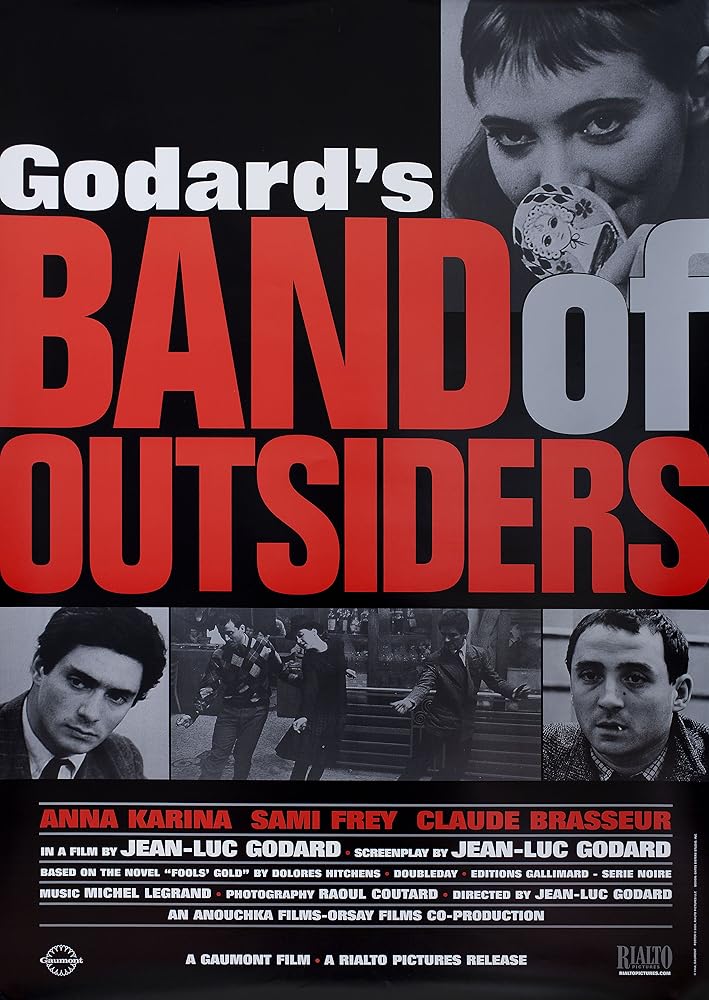
BAND OF OUTSIDERS (Bande à part)
(director/writer: Jean-Luc Godard; screenwriter: from the novel “Fool’s Gold” by Dolores Hitchens; cinematographer: Raoul Coutard; editors: Françoise Collin/Dahlia Ezove/Agnès Guillemot; music: Michel Legrand; cast: Anna Karina (Odile), Claude Brasseur (Arthur), Sami Frey (Franz), Louisa Colpeyn (Madame Victoria), Ernest Menzer (Arthur’s Uncle), Danièle Girard (English Teacher), Jean-Luc Godard (Narrator); Runtime: 97; MPAA Rating: NR; producer: ; Rialto Pictures/Criterion; 1964-France, in French with English subtitles)
“A fun film.“
Reviewed by Dennis Schwartz
Supposedly New Wave French director and former film critic Jean-Luc Godard’s sequel to Breathless is a lighthearted almost gangster type of flick, that pays homage to Godard’s love affair with pulp novels and Hollywood and to the naivety of the young actress Anna Karina–the love of the director’s life back then. It was shot in black-and-white and on location in Paris. It is based on the American Dolores Hitchens 1950s pulp novel “Fool’s Gold” and delivers a free-spirited romp that is a blend of musical comedy, slapstick, improv tough guy acting-out scenarios, and some minor philosophical observations about life. It is meant to be an enjoyable and accessible film. In that it succeeds because the main characters are without guile and their restlessness and dumbness reflects the mid-1960s mindset for many, a precursor to the heavier times to follow when there was great political and social changes throughout the world. It pokes gentle fun at American culture without getting more in its face. Since I’m not a fan of the director, I guess I liked this one because it was less pretentious than his other films and easier to take as a fun film that still has more bite in it than most such films by other directors.
Godard provides the ongoing voice-over throughout, as his narration is done in a droll mock-serious tone.
Lowlifes Arthur (Claude Brasseur) and Franz (Sami Frey) are pals, who are down on their luck. The pretty girl Odile (Anna Karina), who is named after a popular novel of the day, attends English classes with Franz. Mistakenly she tells the slacker she lives on the outskirts of Paris in a big house with her aunt (Louisa Colpeyn), who keeps wads of money unlocked in the house. This leads the vulgar Arthur and the more intellectually inclined Franz to plan to rob the money, as they talk Odile into helping them and use their romantic skills to keep her interested in the project and go for the adventure instead of her secure life.
When the duo drive in their Simca convertible to case the villa, located near the Marne, Arthur unwittingly quotes from Verlaine “”It’s cold and forlorn here.” In another funny bit they play-acted a shootout in the street between Billy the Kid and Sheriff Pat Garrett.
To get everyone on the same page of the plan, Arthur sneaks into their English class as they are translating Shakespeare and the teacher is quoting from T. S. Eliot “Everything that is new is automatically traditional.” They then cut class after the break to go to a cafe where the trio does an eye-catching animated dance version of the Madison, with Odile wearing Franz’s hat. It’s a non-partnered line dance done to a syncopated beat, with hand-clapping and jerky movements. This number reflects the film’s theme that even when ‘people are together, they are alone.’ When Arthur and Franz are alone they read aloud from the newspaper one gruesome crime story after another, with the most spectacular being a tribal massacre in Rwanda (which shockingly still rings true today). Later riding around Paris, Odile comments how beautiful the Louvre is in white and the one who painted it that color deserves a medal. The three then tour the Louvre in record breaking time, successfully beating the record of an American who breezed through it in under ten minutes. Though both fall in love with Odile, they love the money more and insist on going through with the robbery even though Odile wants to back out. The botched robbery ends in disaster and a double-cross, with a half-hearted deadly shootout on the lawn that aped how they filmed in the days of the silent picture. The film leaves you with it a dreamy Hollywood ending about love conquering all and how this adventure calls for a sequel. This breezy mood ending for the film is reflected by an earlier Godard narration on his anti-hero lead “He wondered if the world was becoming a dream or if a dream was becoming the world.”
Godard has rarely mixed his art and pulp in such a skillful display of innovative filmmaking, as he does here. He makes you wonder if life is like a movie or vice versa.
Michael Legrand’s jazz-type of score is used effectively to capture the film’s carefree gay mood.
REVIEWED ON 11/30/2003 GRADE: B